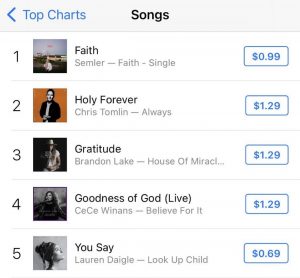In a tweet on June 29, queer Christian artist Grace Aldridge, known professionally by their stage name “Semler,” shared a screenshot of the iTunes music charts for that day.
Their new single, “Faith” was the No. 1 song on Christian music charts, topping hits by well-established, mainstream Christian artists such as Chris Tomlin and Lauren Daigle. The next day, Rolling Stone included the song in its list of “songs you need to know this week,” where the piece rests among popular singles by mainstream and secular artists including Olivia Rodrigo, Charli XCX and Fall Out Boy.
 The song opens with a soundbite from one of Billy Graham’s sermons, in which he asks listeners to consider this: “That’s the question,” proclaims Graham, “Jesus Christ, who are you?” During the last few seconds of the song, Graham’s voice reappears in another soundbite as he asks once again, “Who is Jesus?”
The song opens with a soundbite from one of Billy Graham’s sermons, in which he asks listeners to consider this: “That’s the question,” proclaims Graham, “Jesus Christ, who are you?” During the last few seconds of the song, Graham’s voice reappears in another soundbite as he asks once again, “Who is Jesus?”
With the song “Faith,” Semler offers some insight by telling a story of how Jesus loved them, even when the church turned them away. This is the first verse: “When my religion turned against me, they said my hopes and dreams were faulty. I showed these holes inside my hands, and they claimed they couldn’t see.”
In these lyrics, Semler compares their experiences of marginalization with the passion narrative, explaining to listeners how their rejection by the church as an institution has left them scarred, yet those who did the damage fail to understand they have done wrong. Semler has survived this harm and has even attempted to level with the church by showing the “holes” in their hands to explain how harmful its behavior has been.
However, the church cannot — or possibly will not — acknowledge this pain and accept accountability for it.
And yet, amid their struggle to be in or out of a relationship with the church, Semler never could let go of their relationship with Jesus. Or perhaps it was Jesus who could not let go of Semler.
In another verse, they sing, “You got me singing ‘hallelujah’ and I don’t even wanna do it.”
Semler continues to describe this struggle by emphasizing how, even when ignored and rejected by the church, they never lost faith in Jesus.
 In the bridge, Semler sings, “But I don’t wanna get small to be in those rooms,” explaining how the mercy found in their relationship with Jesus allows them to flourish far more than they have in any church building. It is this mercy, Semler says, that has allowed them to maintain and strengthen their faith in Jesus. In the chorus they add, “But I still have faith. When you call my name, I’ve never been the same.”
In the bridge, Semler sings, “But I don’t wanna get small to be in those rooms,” explaining how the mercy found in their relationship with Jesus allows them to flourish far more than they have in any church building. It is this mercy, Semler says, that has allowed them to maintain and strengthen their faith in Jesus. In the chorus they add, “But I still have faith. When you call my name, I’ve never been the same.”
Growing closer in a personal relationship to Jesus, by the end of the song, Semler has led listeners to this simple conclusion: God is love, and Jesus is the Messiah of God.
In other words, Jesus’ love is extraordinary, and there is no person Jesus does not love. We must remember that and, in turn, love Jesus back, although this may be difficult amid declarations others make about who they think Jesus is.
Related articles:
Queer Christian artist Semler wants to attend the Dove Awards as somebody’s plus-one
How did an openly queer artist climb to No. 1 on the Christian music charts?


